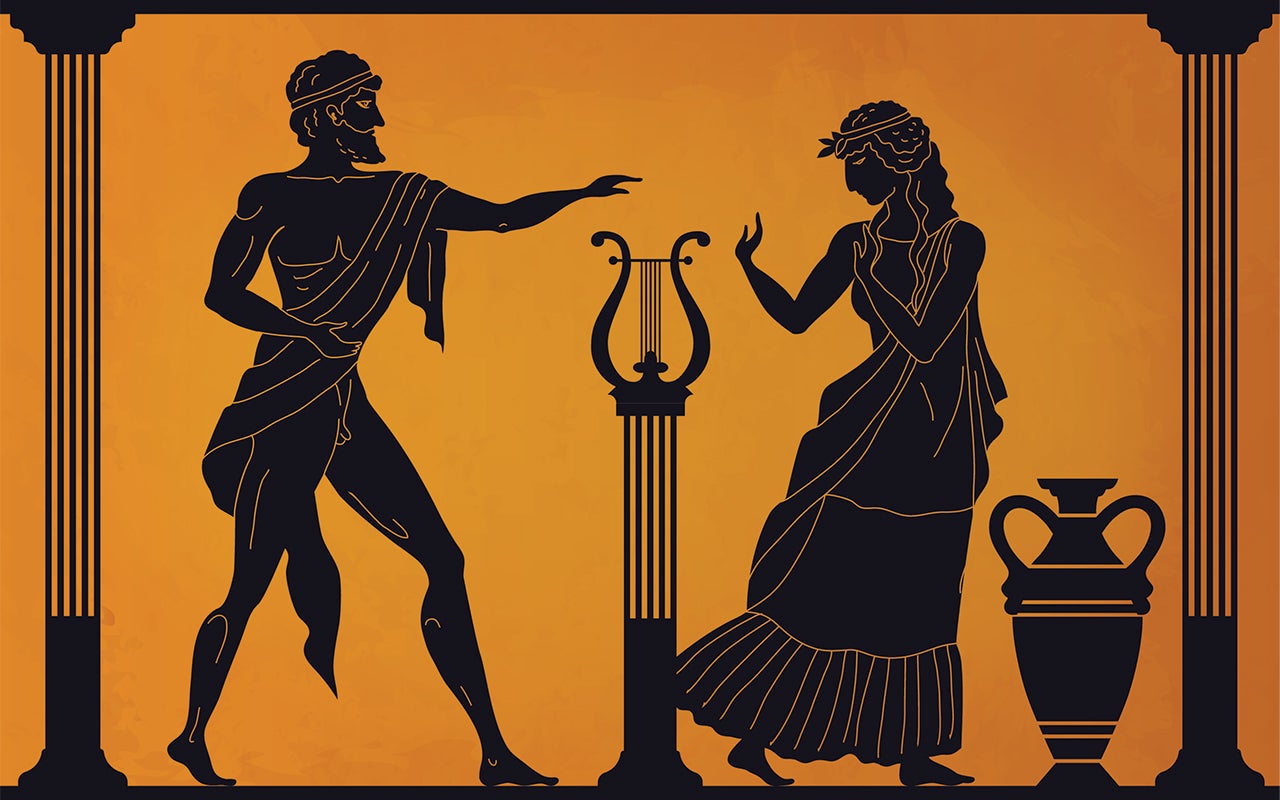
Sure, here's the introduction wrapped with
tags:
Mythology has been an integral part of human culture for centuries, shaping belief systems, rituals, and art across different civilizations. The fascinating world of mythology is filled with captivating stories of gods, goddesses, heroes, and mythical creatures that continue to captivate and intrigue people of all ages. From ancient Greek and Roman myths to Norse and Egyptian legends, mythology offers a rich tapestry of tales that entertain, educate, and inspire. In this article, we’ll delve into 19 fun facts about mythology that shed light on its enduring influence and significance in the realm of culture and the arts.
Key Takeaways:
- Mythology is filled with fascinating gods and heroes from different cultures, such as Zeus, Osiris, and Thor, each with unique powers and epic adventures.
- These ancient myths continue to inspire art, literature, and popular culture, showcasing the enduring appeal of timeless stories of heroism, love, and the eternal struggle between good and evil.
Zeus was the king of the gods in Greek mythology.
Zeus, the son of Cronus and Rhea, was the supreme ruler of Mount Olympus and the gods who lived there. He was the god of the sky and thunder and was often depicted with a lightning bolt. Known for his numerous affairs and offspring, Zeus played a pivotal role in many Greek myths and was revered as a powerful and formidable deity.
The Egyptian god of the afterlife, Osiris, was also the god of the dead and resurrection.
Osiris was a central figure in Egyptian mythology, associated with the cycles of nature, life, death, and rebirth. He was believed to judge the souls of the deceased in the afterlife and was often depicted as a mummified pharaoh. His story, including his murder by his brother Set and his wife Isis’ efforts to resurrect him, symbolized the eternal struggle between good and evil.
Norse mythology features the mighty god Thor, known for his powerful hammer, Mjolnir.
Thor, the son of Odin, was revered as the god of thunder, storms, and protection in Norse mythology. He wielded the enchanted hammer Mjolnir, which could level mountains and always return to his hand when thrown. Thor’s adventures and battles against giants and monsters were legendary, and he was widely worshipped by the Norse people.
The Greek goddess Athena was associated with wisdom, courage, and warfare.
Athena, the daughter of Zeus, was highly revered as the patroness of Athens and the goddess of strategic warfare, handicrafts, and the arts. She was often depicted in full armor, symbolizing her role as a fierce and strategic warrior. Athena’s wisdom and intelligence were celebrated, and she was a symbol of civilization, inspiration, and justice.
In Hindu mythology, Lord Ganesha is worshipped as the remover of obstacles and the god of beginnings.
Ganesha, the son of Lord Shiva and Goddess Parvati, is revered as a deity of intellect, wisdom, and good fortune. With his elephant head and a large belly, Ganesha is a beloved figure in Hindu culture, often invoked at the start of new ventures and endeavors. His popularity extends beyond India, and he is celebrated as a symbol of overcoming challenges and achieving success.
The Japanese goddess Amaterasu is revered as the goddess of the sun and the universe.
Amaterasu, one of the principal deities in Shinto mythology, is revered as the divine ancestress of the Japanese imperial family. She is associated with the sun and is believed to bring light and warmth to the world. The myth of Amaterasu’s temporary retreat to a cave, leading to darkness and chaos, reflects her significance in maintaining cosmic order and harmony.
The Norse god Loki was known for his cunning and mischief.
Loki, a complex figure in Norse mythology, was a trickster god associated with fire, magic, and shapeshifting. His unpredictable nature often led to both beneficial and chaotic outcomes, making him a controversial and intriguing figure in Norse myths. Despite his mischievous tendencies, Loki played a pivotal role in various Norse legends and was a key ally and adversary to the gods.
The Greek hero Perseus famously slew the monstrous Gorgon, Medusa.
Perseus, known for his daring exploits, embarked on a quest to defeat the Gorgon Medusa, whose gaze turned people to stone. With the aid of divine gifts, including a reflective shield and winged sandals, Perseus successfully beheaded Medusa, using her severed head as a weapon in subsequent adventures. His heroic deeds and triumph over formidable adversaries made him a legendary figure in Greek mythology.
The Egyptian goddess Isis was revered as a powerful sorceress and the embodiment of maternal love.
Isis, a central figure in Egyptian mythology, was revered as the ideal mother and wife, embodying maternal devotion, magic, and healing. She played a crucial role in the resurrection of her husband Osiris and was revered as a protective deity, particularly during childbirth and nurturing. Isis’ widespread worship extended beyond Egypt, and her influence transcended various aspects of ancient Egyptian culture and spirituality.
Hindu mythology features the epic tale of the Ramayana, chronicling the adventures of Lord Rama.
The Ramayana, a revered Hindu epic, narrates the journey of Lord Rama, his wife Sita, and his loyal companion Hanuman. Filled with valor, devotion, and moral dilemmas, the epic highlights the triumph of good over evil and the enduring power of righteousness. The Ramayana continues to inspire devotion, ethical values, and cultural traditions across diverse communities in India and beyond.
The Greek god Hades ruled the underworld and was responsible for the souls of the deceased.
Hades, the brother of Zeus and Poseidon, presided over the realm of the dead and enforced the laws of the afterlife. Despite his ominous domain, Hades was not considered an evil figure in Greek mythology but rather a stern guardian of the departed. His abduction of Persephone, leading to the cycle of seasons, added layers to his character and significance in Greek myths.
In Norse mythology, the Valkyries were fierce warrior maidens who selected the slain for the afterlife.
The Valkyries, often depicted as formidable and elegant figures, were tasked with choosing the bravest warriors from the battlefield to join the ranks of the honored dead in Valhalla. These divine maidens played a crucial role in Norse beliefs, symbolizing valor, fate, and the warrior ethos. The tales of the Valkyries continue to captivate audiences and inspire artistic interpretations in various forms of media.
The Hindu goddess Durga is revered as the divine mother and the embodiment of feminine power.
Durga, a prominent deity in Hindu mythology, is celebrated as a fierce warrior goddess who vanquishes demons and protects the righteous. She is depicted with multiple arms, each holding symbolic weapons, signifying her ability to combat evil and uphold cosmic order. Durga’s festivals, particularly during Navaratri, showcase her role as a symbol of strength, courage, and divine grace.
The Greek hero Hercules, known for his incredible strength, completed twelve legendary labors.
Hercules, the son of Zeus, undertook a series of daunting tasks, known as the Twelve Labors, as atonement for a tragic event. From slaying the Nemean Lion to capturing the Golden Hind and Cerberus, Hercules showcased unparalleled strength, courage, and resourcefulness. His enduring tales of heroism and redemption have left an indelible mark on Western literature, art, and popular culture.
Japanese folklore features the legendary creature Kitsune, a fox spirit with shape-shifting abilities.
Kitsune, often depicted as a cunning and intelligent entity, is a prominent figure in Japanese folklore and mythology. These fox spirits are believed to possess magical powers, including the ability to transform into human forms and manipulate illusions. Kitsune legends encompass themes of trickery, wisdom, and spiritual significance, reflecting their enduring presence in Japanese cultural narratives.
In Greek mythology, the winged horse Pegasus sprang from the blood of the slain monster Medusa.
Pegasus, a majestic and divine creature, emerged from the blood of Medusa after Perseus beheaded the Gorgon. With his wings and ethereal beauty, Pegasus became a symbol of inspiration, poetry, and the soaring spirit. The iconic image of Pegasus has permeated art, literature, and popular imagination, embodying the timeless allure of mythical beings.
The Hindu epic Mahabharata chronicles the epic conflict between the Pandavas and the Kauravas.
The Mahabharata, an ancient Indian epic, weaves a rich tapestry of intricate narratives, philosophical discourses, and moral dilemmas. The colossal battle between the Pandava and Kaurava princes, guided by divine intervention and complex human emotions, forms the heart of this epic. The Mahabharata’s enduring legacy encompasses profound wisdom, ethical teachings, and profound reflections on the nature of existence.
The Greek goddess Aphrodite, associated with love and beauty, emerged from the sea foam.
Aphrodite, the radiant goddess of love and desire, was born from the sea foam near the island of Cyprus. Her unparalleled beauty and enchanting presence captivated both gods and mortals, and she held sway over romantic entanglements and passionate affairs. Aphrodite’s influence extended to art, poetry, and the celebration of love, making her a central figure in Greek mythology and culture.
In Egyptian mythology, the god Anubis was revered as the guardian of the dead and the god of mummification.
Anubis, often depicted with the head of a jackal, played a crucial role in guiding souls through the afterlife and overseeing the embalming process. His solemn and enigmatic presence in Egyptian beliefs reflected the intricate rituals and beliefs surrounding death and the journey to the underworld. Anubis’ enduring significance in Egyptian culture underscores the profound reverence for the mysteries of life and death.
Conclusion
Mythology is a fascinating and intricate tapestry of stories and beliefs that have shaped cultures and civilizations for centuries. From the powerful gods and goddesses to the epic tales of heroism and adventure, mythology continues to captivate and inspire people around the world. By delving into the rich tapestry of mythology, we gain a deeper understanding of the human experience and the timeless themes that connect us all. Whether it’s the Greek, Roman, Norse, or any other mythology, these stories offer valuable insights into the human condition and the universal quest for meaning and significance.
And here are the FAQs related to the title "19 Mythology Fun Facts":
html
FAQs
Q: What is mythology?
Mythology refers to a collection of myths, legends, and stories that are passed down through generations within a culture or society. These narratives often involve supernatural beings, deities, and heroes and are used to explain natural phenomena, teach moral lessons, or convey the beliefs and values of a society.
Q: What are some common themes in mythology?
Common themes in mythology include the creation of the world, the interactions between gods and mortals, the concept of heroism, the struggle between good and evil, and the consequences of hubris and disobedience.
Q: How has mythology influenced art and literature?
Mythology has served as a rich source of inspiration for artists and writers throughout history. It has been depicted in countless paintings, sculptures, poems, novels, and films, showcasing the enduring impact of these timeless stories on human creativity and imagination.
Q: Why is it important to study mythology?
Studying mythology provides valuable insights into the cultural, religious, and philosophical beliefs of different societies. It also offers a deeper understanding of universal human experiences, such as love, heroism, betrayal, and the search for meaning, making it an essential aspect of the human experience.
Q: How are mythological themes relevant in today’s world?
Mythological themes continue to resonate in modern society, influencing literature, pop culture, and even political discourse. The enduring relevance of these themes reflects their timeless appeal and their ability to address fundamental aspects of the human condition.
Was this page helpful?
Our commitment to delivering trustworthy and engaging content is at the heart of what we do. Each fact on our site is contributed by real users like you, bringing a wealth of diverse insights and information. To ensure the highest standards of accuracy and reliability, our dedicated editors meticulously review each submission. This process guarantees that the facts we share are not only fascinating but also credible. Trust in our commitment to quality and authenticity as you explore and learn with us.


